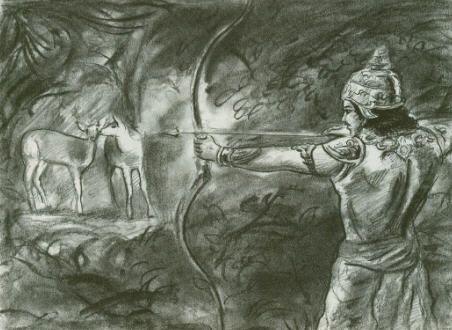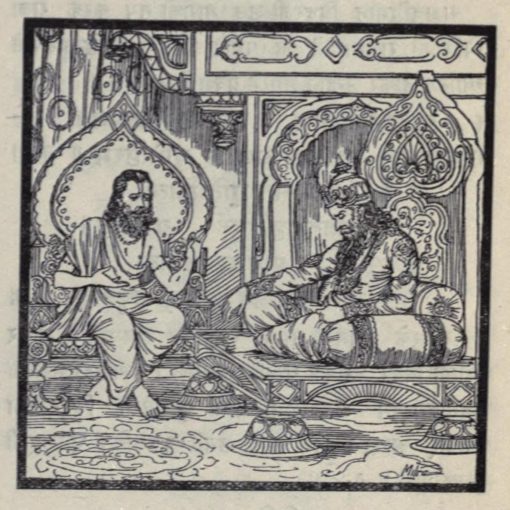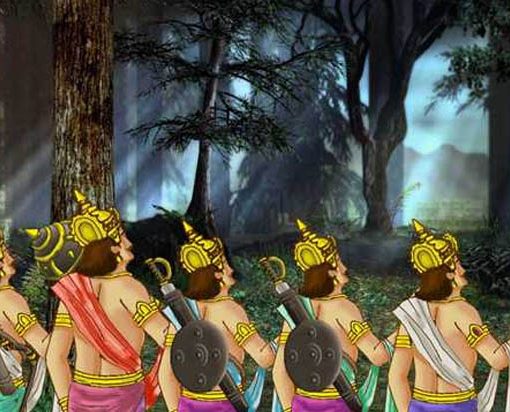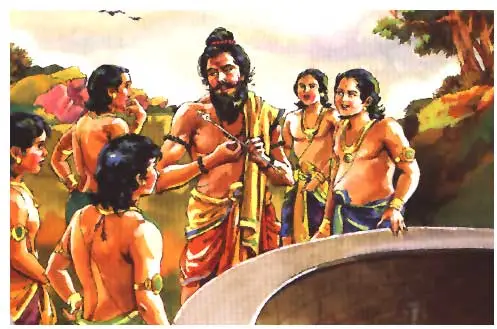One day Pāṇḍu went out hunting. He saw a couple of large deer mating. They bolted when they saw the king, but he quickly fired five swift arrows after them. As the golden-feathered shafts pierced the male deer, it fell down crying. To the king’s surprise the dying deer began to speak in a pained voice.
“Oh, how shameful! Even degraded men who are slaves to their senses never act so cruelly. No man’s judgment can ever prevail against the ordinance of scripture. How then have you, the king and a descendent of the noble Bharata race, acted so, in conflict with Vedic ordinance?”
Pāṇḍu stood before the deer, which was weeping bitterly, and replied, “As a king it is my duty to hunt. I thus control the forest, making it safe for the ṛṣis. At the same time, I am able to practice the kingly art of weaponry. Furthermore, even great sages in the past have killed deer in the forest by offering them in sacrifice. O deer, why do you reprove me?”
The deer replied that it did not condemn Pāṇḍu for injuring it, but for not taking into consideration that it was mating. The deer then told Pāṇḍu that it was a ṛṣi named Kindama. He had assumed the form of a deer to mate with his wife in the woods. The ṛṣi had no dwelling and could not unite with his wife in a human form as people would criticize. He had therefore transformed himself and his wife into deer. The king had killed him just as he was about to beget a child in his wife’s womb. Kindama continued, “No creature should be attacked at the moment of intercourse. Your act was extremely cruel and sinful, and is liable to lead you to hell. It is especially reproachful as you are a king and are meant to chastise the wicked and protect the tenets of religion.”
Pāṇḍu gazed at Kindama in shocked silence. He had spoken correctly. It had certainly been sinful to shoot at the deer as it mated. How had he allowed himself to be so overcome with passion? And what would come from having killed a ṛṣi? This was a calamity. The king hung his head in shame.
Seeing Pāṇḍu’s crestfallen condition, Kindama said, “You need not fear the sin of killing a Brahmin, as you did not know my true identity. But as you killed me when I was indulging in pleasure, so too shall you meet your death at such a time.”
The ṛṣi wanted to free Pāṇḍu from his sin. By cursing the king, Kindama knew that Pāṇḍu would immediately receive the reaction for his misdeed and thus not have to suffer after death. Struggling to speak as his lifeblood ebbed away, Kindama uttered his fearful imprecation.
“When next you approach your wife out of desire, you will immediately fall dead. O King, as I was plunged into grief when I was happy, you shall also meet with grief at such a time.”
The deer then gave up its life. Pāṇḍu stood for some moments unable to move. As he gazed at the deer’s dead body hot tears ran down his cheeks. Gathering his wits, he returned to his hut. He immediately told his wives what had happened. Afflicted by sorrow, the king wept aloud with his two queens. He condemned himself again and again. Holding his head and lamenting, the king spoke in an anguished voice: “I have heard that my father, although born of a virtuous man, was himself a slave of lust and died as a result. Having been begotten in the wife of a lustful king, I too have become afflicted with lust. I have become devoted to sin. My life is simply spent in killing innocent creatures. The gods have forsaken me and I stand cursed.”
Pāṇḍu resolved to live a life of austerity. He declared that from that moment he would accept a vow of celibacy, as Bhīṣma had done. He would seek salvation by renouncing all sexual pleasure, the great impediment to spiritual understanding. Pāṇḍu spoke to his horrified wives, “I shall shave my head and cover my body with dust. Sorrow and joy will be equal to me. I will entirely renounce anger and I shall be devoted to the good of all creatures. I will accept no gifts and I will obtain my food by begging. In this way, I shall transcend the dualities of this world and rise to the highest regions, where the Lord himself resides.”
The king asked his wives to return to the capital and inform his elders of the turn of events. They should gratify the Brahmins on his behalf, giving them much wealth. For his part, he would immediately retire into the wilderness and leave society forever.
Kuntī and Mādrī were torn by grief. They could not face the prospect of separation from their husband. In piteous voices they begged that he allow them to follow his path. Both queens were prepared to accept whatever austerities he accepted. On behalf of them both, Kuntī said, “Let us together accept the order of vānaprastha, retirement in the forest. We shall be happy practising asceticism with you. If you leave us today, we shall not bear our lives any longer.”
Pāṇḍu relented, but he made it clear that he intended to perform the strictest austerities. His wives were not deterred. They wished only to be with him wherever he went.
Pāṇḍu resolved to embark on his ascetic life immediately. He would not return to the city. He removed all his royal ornaments and gave them, along with his riches, to the Brahmins. Then he said to his attendants, “Go back to Hastināpura and inform Bhīṣma of everything that has occurred.”
The royal attendants and Brahmins left sorrowfully for Hastināpura. The citizens lamented loudly when they learned of Pāṇḍu’s plight. Dhṛtarāṣṭra was especially afflicted. Thinking of Pāṇḍu living so austerely in the forest, he could no longer derive pleasure from the comforts of his beds, servants and royal opulences. He continually wept and brooded over Pāṇḍu.





